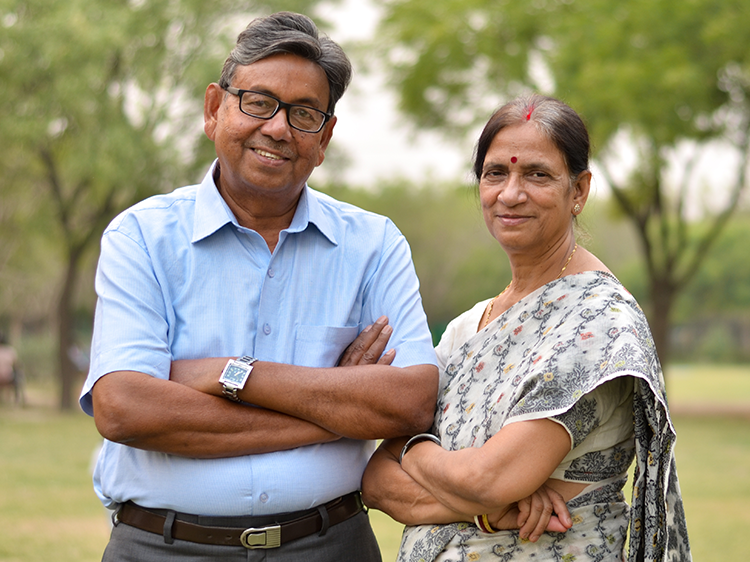
Signs of Elderly Mental Health Issues
Mental health is gaining a lot of importance in recent times, but the majority of the conversation centres around young people or working professionals. According to the WHO, approximately 15% of adults aged 60 and over suffer from a mental disorder. Globally, the population is ageing rapidly. Between 2015 and 2050, the proportion of the world’s population over 60 years will nearly double, from 12% to 22%. The time is now to talk about mental health among the elderly.
Most Common Mental Illnesses in Elders
First, let us understand what are the common mental health problems that that the elderly face
Dementia: Dementia is a syndrome, usually of a chronic or progressive nature, in which there is deterioration in memory, thinking, behaviour and the ability to perform everyday activities. It mainly affects older people, although it is not a normal part of ageing.
Depression: Depression (including anxiety) is a common and serious medical illness that negatively affects how you feel, the way you think and how you act. The symptoms are often overlooked and untreated because they co-occur with other problems encountered by older adults.
Bipolar Disorder: Bipolar disorders, or manic-depressive illnesses, are often marked by unusual mood shifts and are frequently misdiagnosed in senior citizens because the symptoms presented are typical with the ageing process, especially related to dementia and Alzheimer’s.
Eating Disorders: Eating disorders like bulimia and anorexia nervosa are becoming increasingly prevalent among the elderly. Eating disorders can go undetected for quite a while before they are identified and treated, making them especially dangerous.
Symptoms
To better treat the mental health of elders, let us familiarise ourselves with the symptoms of mental illness seen amongst the aged
- Confusion, disorientation, and problems concentrating or decision making
- Changes in the weight – increase or decrease in the appetite
- Memory Loss, especially short-term memory problems
- Unexplained fatigue and energy loss or trouble sleeping/ sleep changes
- Avoiding friends & family or loss of interest in things that used to be enjoyable
- Feeling depressed for longer than two weeks
- A feeling of worthlessness, inappropriate guilt, and helplessness
- General disinterest in living or thoughts of suicide
- Changes in appearance or dress, or problems maintaining the home or yard
- Physical problems that can’t otherwise be explained: aches, constipation, etc.
- Trouble handling finances or working with numbers.
Causes
While there can be a variety of causes for the decline in mental health, here are some triggers that could cause them
Retirement
Retirement disrupts decades of routine, and it makes them dependent which is not pleasant for a senior person. Such people also witness a dip in their self-esteem, self-confidence, and a loss of sense of authority leading to depression and anxiety.
Change in Support Systems
Loss of a spouse, loss of peers and a rise in nuclear families can lead to the elderly feeling lonely, left behind or under-appreciated leading to various kinds of mental health issues.
Financial Issues
With a loss of a steady source of income elderlies increasingly feel a sense of helplessness, uncertainty, and dependency, which also affects their quality of life.
Age-Related Issues
With old age comes age-related illnesses. The constant struggle, chronic pain, long term tobacco or alcohol consumption and the inability to get a balanced nutritional diet can be debilitating for people who had consistent younger years.
How to assess and what to do?
When the elderly become incapable of recognising their ailments, the responsibility of making sure their mental health is in check falls on their caretakers and their relatives. Assess these factors to decide whether the individual requires consultation with a psychiatrist
- If the individual finds it difficult to carry out life tasks and self-care activities, such as dressing, preparing meals, or using the phone.
- If the individual can’t be trusted with their own safety, including financial safety, driving, etc.
- If the individual has any physical health issues, including pain or uncomfortable symptoms, hospitalizations, or loss of appetite.
- Check the general mood and brain health of the individual for feelings of hopelessness, loss of interest in activities they used to enjoy, or isolation.
- Check if the individual is taking the required medication without skipping them and if there are worrisome side effects or symptoms related to those medications.
If you feel the elder person needs help, please bring them to the People Tree Maarga. People Tree Maarga is the best psychiatric hospital in Bangalore with a state-of-the-art healthcare facility, aimed at transforming ‘mind care’ in India. They have a special department for senior care which includes multidisciplinary acute & chronic psychiatric & rehabilitation services. They have the best psychiatrists in Bangalore with decades of experience in diverse specialities, ready to provide holistic care and warm reception to your elders.


Social Media Sharing